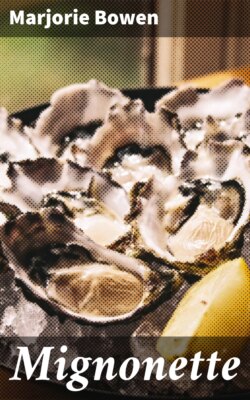Читать книгу Mignonette - Bowen Marjorie - Страница 14
На сайте Литреса книга снята с продажи.
§ 11
ОглавлениеTable of Contents
Barbara had a letter from Francis Shermandine in the reticule swinging at her waist as she directed Harding and the maid in arranging the Chinese room. He wrote frequently, friendly, charming letters expressing his interest in drawing, painting, architecture, the additions to Judith Spinney, his uncle's place in Wiltshire where he had gone on leaving the Isle of Wight.
Barbara had never expected more than this; she still thought of their short acquaintance, her own mourning, though several weeks had gone by since they had first met, and her father was split into vague figures in her mind, the bizarre and unknown adventurer who was also the father of Aimée, and the bleak businessman she recalled every Sunday, when kneeling in St. Peter's she saw his new-cut name on the gray mural tablet.
The Chinese room was very well preserved. The long dead grandmother's youthful whim came to light in brilliant hues of parrot and heron, peony and hawthorn blossoms in the Chinese paper, and the removal of the holland covers revealed delicate furniture with frets in friezes, galleries and sketches.
The household presses contained chintz that matched the wallpaper. Blue apple blossom pots for the lattice shelves and other fine porcelain were found in the china cupboard, and the elaborate bed, in the Eastern style, was soon fitted with hangings and coverlet in a thick silk of a saffron yellow that Barbara thought was a Chinese color. The dressing table was japanned in black and gilt, and Barbara equipped it with a toilette service in white Bristol paste. Harding thought the whole effect "outlandish" but conceded that it might suit a foreigner.
"She will not be in mourning," emphasized Barbara, "and will like to have the appointments gay."
The morning of Aimée's arrival, Barbara placed a large beau pot of multicolored roses on the bedside table, with a pile of anxiously chosen books, Keepsakes, The Lady's Almanac, and the Sermons of Dr. Tillotson, an old volume, but one that her father had often said "could not be bettered." Barbara hoped that the tolerant divine's comfortable moralizing would not offend even a Papist.
She hesitated over the room, adjusting this, altering that, nervous through the long habit of trying to please.
Then depression shook her; this was a stranger, an alien, she was having into her home. She felt shy, awkward, already looking forward to the autumn when Aimée would be returning home.
The secret was a weight, also; it was buried deeply, certainly, but she was afraid of it. Then there was the problem of Aimée's marriage. If the girl was satisfied with that, Barbara did not mean to interfere, it no longer seemed such a coarse and repulsive method of settling her destiny. But supposing she was to throw herself on the mercy of the woman whom already she termed her "benefactress?" Then Barbara would have to consider some fresh scheme for Aimée. And her whole being was now absorbed in her own plans.
But there was Francis Shermandine. He would help her, with his masculine wisdom and experience, though it would be difficult to explain to him precisely why she had to take on the responsibility of settling in life the daughter of a friend of her mother's—and a girl, at that, whose acquaintance she had just made.
Harding had already remarked that Barbara was taking a deal of trouble over the visit of a foreigner and a stranger.
Barbara had excused herself by protesting that she desired some young company, and Harding had murmured something about her mistress having herself to think of, and Barbara was pleased to know that the meaning of this was the old servant's expectation of a marriage soon in Stone Hall.
To Francis Shermandine she wrote casually "of my little French friend, to whom I am to give a glimpse of English life."
Then she wondered if Aimée was little. Surely one to whom the name Mignonette was given must be what the French termed petite.
Barbara often tried to visualize Aimée. French girls were not pretty, she believed, but vivacious and smart. "Not like Monsieur Lawne." Barbara had only known her father since he had been worn by ill health, unremitting work, and the heavy burden of a self-imposed routine, but he had been good-looking, with her own hazel coloring.
Aimée would be dark, of course, almost certainly plain, in Barbara's reasoning, or she would not have had to resort to a matrimonial agency for a marriage.
Mr. Bompast might argue as he would, Barbara could not believe that in any country a pretty, charming girl would lack for suitors.
Neither would Aimée, living so retired, with this painful blight over her birth, be chic in the sense that the Parisian fashion plates Barbara studied, without the least intention of copying, were chic. No, she was likely to be shy, neat, appealing, suppressed—yes, she was sure to feel her position acutely, to be decorously dressed, rather like an upper servant. That discreet, careful Madame Falconet, who was probably not, Mr. Bompast had thought, a lady, would certainly have a daughter of that kind.
Barbara planned their common activities. She could improve her copybook French, and Aimée was no doubt a dainty needlewoman. She hoped that Harding would like her, and such acquaintance of the Lawnes who still called at Stone Hall, such as Mrs. Mildmay, the doctor's wife, for Barbara wanted much of her own time free in order to spend it with Francis Shermandine.
